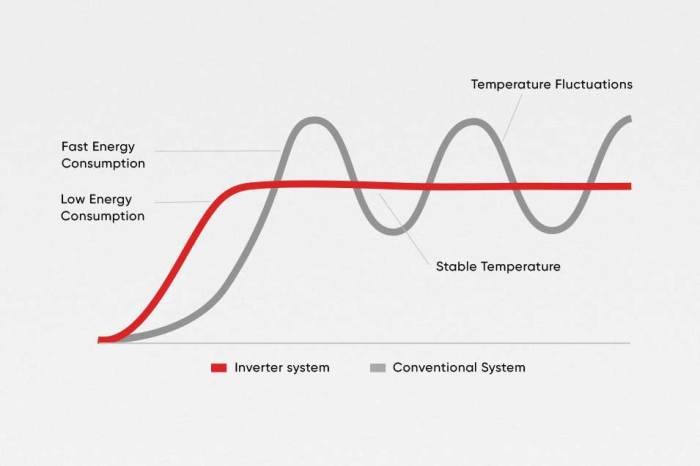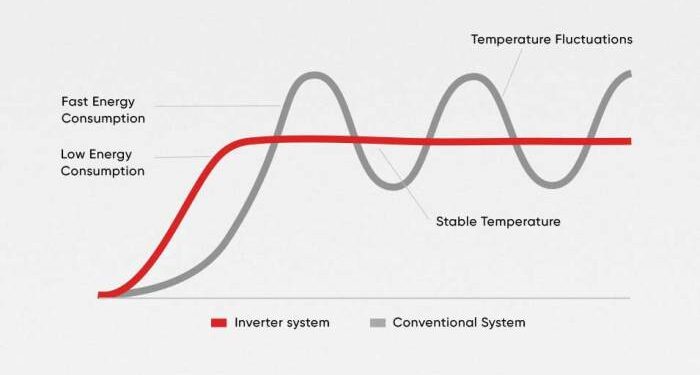Delving into the realm of Why Inverter ACs Are a Smart Long-Term Investment, this piece sets the stage for an enlightening exploration, enticing readers with valuable insights and practical wisdom.
Exploring the benefits, technology, durability, and environmental impact of inverter ACs, this guide aims to shed light on why they make a wise long-term investment.
Benefits of Inverter ACs
Inverter ACs are a smart long-term investment due to their energy-saving capabilities, cost-effectiveness, and ability to maintain consistent temperatures for enhanced comfort.
Energy Efficiency
Inverter ACs use advanced technology to regulate the speed of the compressor motor, adjusting cooling capacity according to the room's requirements. Unlike traditional ACs that work at a fixed speed, inverter ACs consume less power by ramping up or slowing down based on the temperature needs.
Cost Savings
Over the long term, inverter ACs can result in significant cost savings on electricity bills. By operating more efficiently and consuming less power, users can enjoy reduced energy expenses compared to traditional ACs.
Consistent Temperatures
Inverter ACs maintain a consistent temperature by continuously adjusting compressor speed to match cooling demands. This results in a more comfortable environment without abrupt temperature fluctuations, ensuring a pleasant indoor experience.
Technology Behind Inverter ACs
Inverter technology is a key feature that sets apart inverter ACs from traditional non-inverter models. It allows the compressor in the air conditioner to operate at varying speeds depending on the cooling needs of the room, leading to improved energy efficiency and comfort.
Adjustable Compressor Speed
Inverter ACs use a variable speed compressor that adjusts its speed based on the temperature requirements of the room. This means that the compressor does not have to constantly start and stop to maintain the desired temperature, resulting in lower energy consumption and reduced electricity bills.
- Unlike non-inverter ACs that operate at a fixed speed, inverter ACs can ramp up or slow down the compressor speed as needed.
- This dynamic adjustment helps maintain a consistent temperature in the room without consuming excess energy.
Noise Levels
One of the benefits of inverter ACs is their quieter operation compared to traditional non-inverter models. The inverter technology enables the compressor to run at lower speeds, reducing noise levels significantly.
- Inverter ACs produce less noise during operation as the compressor operates at lower speeds most of the time.
- On the other hand, non-inverter ACs tend to be noisier due to the frequent on-off cycles of the compressor.
Durability and Maintenance

Inverter ACs are known for their durability and require proper maintenance to ensure a long lifespan.
Variable Compressor Speed
One key factor that contributes to the longevity of inverter ACs is the variable compressor speed. Unlike traditional ACs that constantly turn on and off at full capacity, inverter ACs adjust the compressor speed based on the cooling needs. This not only reduces energy consumption but also minimizes wear and tear on the compressor, resulting in a longer lifespan for the unit.
Regular Maintenance
Regular maintenance is essential to keep your inverter AC running efficiently. Cleaning or replacing the air filters, checking for any refrigerant leaks, and ensuring the condenser coils are clean are all important tasks that should be done regularly. Additionally, scheduling annual professional maintenance checks can help identify any potential issues before they become major problems.
Tips for Prolonging Lifespan
- Keep the outdoor unit clean and free from any obstructions to ensure proper airflow.
- Set the temperature to a moderate level to reduce the workload on the unit.
- Avoid frequent temperature adjustments as it can strain the compressor.
- Use a voltage stabilizer to protect the AC from power fluctuations.
- Invest in a quality installation to ensure optimal performance and longevity of the unit.
Environmental Impact
Inverter air conditioners offer several environmental benefits compared to traditional non-inverter models. They are designed to be more energy-efficient, which ultimately leads to a reduction in greenhouse gas emissions.
Eco-friendly Refrigerants
Inverter air conditioners use eco-friendly refrigerants such as R32 or R410A, which have a lower impact on the environment compared to older refrigerants like R22. These refrigerants are designed to be more energy-efficient and have a lower global warming potential, making them a more sustainable choice for cooling systems.
Overall Energy Conservation
Inverter ACs contribute to overall energy conservation by operating more efficiently than non-inverter models. They adjust their cooling capacity based on the room temperature, resulting in less energy wastage. This not only reduces electricity consumption but also helps in lowering carbon emissions, making them a more environmentally friendly option for cooling your space.
Epilogue
In conclusion, Why Inverter ACs Are a Smart Long-Term Investment emerges as a prudent choice for those seeking energy efficiency, comfort, and sustainability in their cooling solutions. With their cost savings, advanced technology, durability, and eco-friendly nature, inverter ACs stand as a compelling option for the future.
Essential Questionnaire
Do inverter ACs really save energy compared to traditional ACs?
Yes, inverter ACs are more energy-efficient as they adjust compressor speed based on cooling needs, leading to reduced energy consumption.
How do inverter ACs contribute to environmental conservation?
Inverter ACs reduce greenhouse gas emissions, use eco-friendly refrigerants, and overall contribute to energy conservation, making them environmentally friendly.
What maintenance tips can help prolong the lifespan of an inverter AC?
Regular maintenance, such as cleaning filters and coils, can enhance the longevity of an inverter AC. Additionally, ensuring proper care and timely servicing is crucial.



